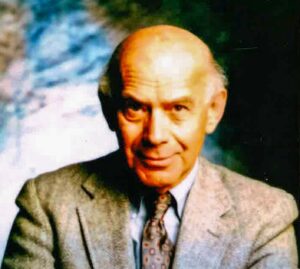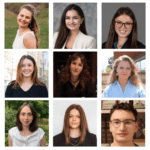This article originally appeared in the winter 2024 issue of Res Gestae.
The S.J. Quinney College of Law is excited to announce the new Alexander Zeev Guiora Bystander Initiative Award, an annual honor recognizing a student who works for and demonstrates profound commitment to the Bystander Initiative, which focuses on the role of bystanders and enablers in sexual assaults.
Honoring a father and a mentor

Named for the late Professor Alexander Zeev Guiora, father of College of Law Professor Amos Guiora, the award is made possible by generous support of two donors: Professor Thomas Scovel and State Representative Brian S. King.
Scovel, an emeritus professor of linguistics at San Francisco State University, worked as Zeev Guiora’s research assistant at the University of Michigan in the 1960s. Years later, an attempt to reconnect with Zeev Guiora led to a friendship with his son.
“I wondered how [Professor Zeev Guiora] was doing, knowing that he had retired to Israel, and was saddened to learn from the University of Michigan website that he had recently died but was survived by a son who taught law at the University of Utah,” Scovel recalls. “So out of the blue, I contacted Amos to tell him how I got to know his father and how much I had learned from him. Since that time, Amos and I have been in frequent contact. Consequently, I leaped at the chance to contribute to this noble cause of bringing those who facilitate sexual crimes to justice.”
It was after his father’s death in 2015 that Professor Amos Guiora learned that Zeev Guiora, a highly regarded psychology, psychiatry, and linguistics professor, was an extraordinary mentor to a wide range of students worldwide.
“According to Professor Scovel, my father’s decision to list him as a co-author of a widely cited article was critical to his professional development. In honor of my father, Professor Scovel donated funds enabling the establishment of a research assistantship in his name,” Guiora says. “Given my relationship with my father and my belief in the importance of mentoring students, Professor Scovel’s gift is meaningful, impactful, and beyond generous.”
Connecting over shared passions within law
King, who earned his bachelor’s degree in economics from the University of Utah in 1982 and his JD from the College of Law in 1985, works frequently with Professor Amos Guiora on issues related to bystanders and enablers of abuse and was excited to contribute to the award.
“The Bystander Initiative is a worthy project. It’s paradoxical, but we’ll never feel our own needs are satisfied unless we are caring for the people around us. We have far too little understanding and appreciation of the benefits for all of us if we increase our sensitivity and commitment to address the acute needs of others in our society,” King says. “Work that goes into gaining a greater understanding of why that is and how we can be better at recognizing and serving each other, particularly when there is situational acuity such as an emergency or disaster, will benefit all of us.”
Creating the Bystander Initiative
Guiora says the Bystander Initiative is the result of private detective Dan Barber’s decision to provide him 15,000 pages of material about the 1997 murder of 12-year-old Jeremy Bell by his teacher/principal in West Virginia, a serial pedophile whom Pennsylvania and West Virginia school administrators had enabled for decades. Barber broke the case after local law enforcement had closed it, and Guiora created a team of students from the law school and University of Utah Honors College to work on the material.

“Creating the initiative required identifying donors who would support our efforts, with a particular focus on funding research positions for our students. Individuals’ immediate and warm responses ensured that we could undertake numerous projects simultaneously, with a unique focus on criminalizing enablers and bystanders,” Guiora explains. “In that context, we have engaged with legislators in the U.S. and internationally. The Bystander Initiative officially began in October 2022.”
Since that time, the initiative has grown to include students and former students from both the University of Utah and elsewhere, including Guiora’s alma mater, Kenyon College. Current projects include:
- Law review articles addressing the harm caused by clergy penitent privilege and law enforcement as enablers in female federal prisons
- A book based on the Jeremy Bell murder about sexual assault of children in schools
- A University of Utah grant-supported study with a public health professor addressing the maltreatment of children
- A co-authored book about University of Michigan students and student-athletes’ sexual assault over 50 years by the team doctor
- A new book project as part of the American Bar Association (ABA) series Guiora on Enablers that addresses enablers in post-Holocaust Hungary and the political developments in Israel over the past year
- A book chapter about the relationship between victory and enablers through the lens of the Israel-Hamas war in the Gaza Strip
- Testifying before the Utah legislature on two bills State Representative Brian King has introduced about enablers and bystanders
- Enablers and Bystanders courses at the S.J. Quinney College of Law and University of Utah Honors College
- Continuing legal education (CLE) credits through the Utah Bar to practitioners, judges, and law enforcement
- Bystander trainings for non-governmental organizations
- Lectures about bystanders and enablers to other organizations

Recognizing a student’s efforts
The Alexander Zeev Guiora Bystander Initiative Award funds a research assistantship for up to 300 hours of work per year and a scholarship to help offset the cost of tuition. 3L Anna Hall, the inaugural winner, says her experience with the Bystander Initiative has allowed her to build connections with people and organizations across the nation.
“We joke that once you get involved with the Bystander Initiative, you always want to continue working on it. Although we deal with tough material because it involves horrible crimes committed against people, it makes it easier knowing that we are shedding light on a topic that most people do not think about,” Hall says. “I will forever be grateful to Professor Guiora for asking me to be one of his research assistants and for giving me the honor of being the first recipient of the Alexander Zeev Guiora Bystander Initiative Award.”
Hall notes that her work on the Bystander Initiative has changed the way she views the world.
“One day, I was driving down the I-215 highway. The visibility was not the best because it was foggy, and I saw a man walking on the side of the freeway. I remember thinking, ‘Oh, I am sure someone else will call highway patrol and warn them about this man because he could get hit,'” she recalls. “Then I remembered Professor Guiora’s Bystander and Enabler class. I thought about how I would feel if I saw on the news that this man had been hit by a car, and I could have done something to warn someone. I immediately called the highway patrol and told them what I saw and that I was worried for this man’s safety. Before taking Professor Guiora’s class and learning about bystanders, I probably would have kept driving.”
Passionate about victims’ rights, Hall says she has talked with a wide range of people over the past eight months through the Bystander Initiative and learned about their frustrations with a system that seems to be against them.
“Far too many people get away with doing nothing when they could be doing something to help. That is why this work is important to me: It makes a difference in people’s current lives and, hopefully, their future lives as well,” Hall says. “I hope that making others aware of the Bystander Initiative will help them think twice about the decisions they are making, to act or not act on something they see or hear about.”
Hall’s work focuses on a federal prison, FCI Dublin, in California, and the female inmates who were sexually assaulted there by male staff, along with the enablers within that system. There have currently been seven guilty verdicts—including the prison warden and chaplain—and one guard charged who has not yet gone to trial.
“I did not realize how much we would uncover when we started this project. There are things that could have been done to prevent further harm to victims, but it was enablers who chose to protect the institution that ensured that the abuse of these vulnerable women continued,” Hall says. “We are submitting our law review article for the February 2024 publishing cycle. I hope that someone in Congress will read this article and realize that it is time for changes to be made on the federal level to ensure that enablers are being held accountable.”
Watch Anna Hall’s video about her experience at S.J. Quinney College of Law.

Growing the Bystander Initiative
Guiora says he identified three initial goals when the Bystander Initiative began: 1) creating impactful and unique research opportunities for highly talented students; 2) undertaking cutting-edge research and writing addressing enablers and bystanders; and 3) impacting the public debate on criminalizing bystanders and enablers by working directly with both U.S. and international legislatures.
“In the 15 months since the initiative was created, thanks to the remarkable generosity of donors and the dedicated team of students, past and present, we have been able to meet the three identified goals. We intend to continue to pursue these three goals to ensure that bystanders and enablers will be held accountable for their actions,” Guiora says. “In that vein, I am beyond grateful to committed students, generous donors, and extraordinary support from the leadership of S.J. Quinney College of Law.”
Learn more about making a gift to continue the Bystander Initiative’s work.
Check out the Little Bit of Life podcast to learn more about Professor Guiora’s research and his new book, “The Complicity of Silence: Confronting Ecosystems Of Child Sexual Assault In Schools.”
